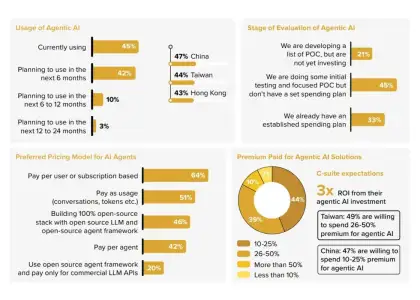Think You’ve Got What It Takes? Here’s a Guide to Pursuing a Financial Career in Hong Kong

We all have a long-term dream that we are pursuing. It could be turning one’s passion into a career, striving for a promotion, or seeking greener pastures in a different field.
Making one’s dreams a reality is tough work, but was made even tougher these past two years due to COVID-19, which upended our lives and plans as we knew them and brought on the shutdown of businesses and a global economic recession.
If you’re thinking about pursuing a financial career or contemplating to move into the banking industry, let’s delve into a variety of factors that constitute the region’s financial framework. These factors may help assess whether you’re ready to advance to the world of finance.
Hong Kong’s Financial Industry Profile and Current Trends
Aspiring financial analysts or specialists need to have a comprehensive understanding of the most recent trends that influence investments, the economy, and the sector as a whole.
As one of the leading financial centres worldwide, Hong Kong’s financial services sector is considered as one of the city’s economic pillars that created more than 270,000 jobs in 2019.
In 2020, the region ranked fifth in the Global Financial Centres Index (GFCI) released by Z/Yen Group and the China Development Institute. In terms of market capitalisation, the Hong Kong stock market ranked third among the largest in Asia and fifth in the world. Moreover, Hong Kong private equity is regarded as the second largest in Asia, with about US$160 trillion capital pool as of 2019.
The city manages a three-tier banking system classified into three types: licensed banks, restricted licence banks, and deposit‑taking companies. These banks differ in restrictions but may receive deposits from the general public. As of December 2020, there were about 161 licensed banks, 17 restricted licence banks and 12 deposit‑taking companies, and 43 representative offices of overseas banks in Hong Kong.
The fintech market consistently evolves, giving birth to virtual banks that affect customer behaviour, client interactions, and even operational processes. This 2022, the Hong Kong finance industry is expected to remain active in digitisation and emerging technologies. These upgrades aim to promote more efficient operations, improve the effectivity of speed-to-market strategy, and better meet the demands of customers while also improving customer service.
Banks are investing more in self-service digital channels via mobile applications and online banking to satisfy customers with new services. On the other hand, blockchain technology and cryptos like Bitcoin, Ethereum, Cardano, and Litecoin are slowly gaining traction in Hong Kong.
Moreover, Asia’s financial landscape is undeniably competitive in security, control, and information management, creating a friendly governance among end users.
The ongoing digital transformation is connected to almost everything else; other key trends that you should keep an eye out for include innovations in artificial intelligence and robotics, as well as changes in customers’ lifestyles.
Top Qualifications and Required Experience
If you’ve ever dreamed of becoming one of the financial managers of HSBC, Citibank Hong Kong, or any other of the world's most prestigious financial institutions, then you must possess the skills or experience to become one of those competitive executives in the future.
You will be assessed depending on your financial decisions and effectiveness in financial management, also referred to as financial literacy. Becoming a financial executive in Hong Kong means managing assets worth millions of dollars coming from multinational companies and investments.
Your proficiency in technology will also be tested including your professional communication skills and enhanced thinking skills when using high-quality IT products. Keep in mind that working in an international company is associated with handling sensitive customer information and processing huge volumes of data regularly.
For basic qualifications, you need to have a minimum of a four-year degree and advanced skills in business, mathematics, economics, or statistics.
Some bachelor's degree programmes offered by Hong Kong universities are Business, Accounting and Financial Studies, Corporate Administration, Professional Accounting, Quantitative Finance, Asset Management, and Private Banking, to name a few.
For those considering a Master of Business Administration (MBA), some of the recommended universities to enrol in are Hong Kong University of Science and Technology Business School, The University of Hong Kong - HKU Business School, and The Chinese University of Hong Kong - CUHK Business School.
Compensation and Benefits
The finance and banking industries are intense and dynamic as they are intertwined with economic factors that shift almost every day, adapting to new trends and perceived hazards. Despite the fast-paced environment, applications for financial careers are high because of the numerous benefits these offer.
Those working in global financial institutions may take advantage of various development opportunities including international travel and training in professional banking.
According to payscale’s salary for industry tool, here are the expected annual salaries(average base) of the following positions:
- Business Analyst, Finance/Banking - HK$330,000
- Assistant Finance Manager - HK$464,698
- Finance Manager - HK$569,950
- Senior Finance Manager - HK$704,019
- Finance Associate - HK$334,000
- Vice President (VP), Finance - HK$837,755
- Senior Associate - Investment Banking - HK$508,682
- Private Banker - HK$930,000
- Relationship Manager, Banking – HK$600,000
- Project Manager, Banking – HK$1,000,000
- Product Manager, Banking – HK$499,00
In a 2021 report from Human Resources Online, the market projection for this year revealed that higher bonus packages are expected from securities firms for mid-Q3. The wage increase applies to employees who are changing jobs.
Private bankers’ salary increased by approximately 20% to 25%, while those working in retail and semi-private wealth management banks ranged from 15% to 25% salary increment. Meanwhile, internal auditors who will switch employers this year will have a 15% to 20% wage increase and talents who specialise in global markets or treasury may demand a 20% higher salary due to shortage of workers.
Challenges and Hardships
As mentioned earlier, the finance and banking sector safeguard the assets and loans of the global economy.
When the COVID-19 pandemic hit, the financial services industry experienced the worst brought on by economic uncertainties. This resulted in a decline in revenues, an increase in the number of impaired loans, inconsistent cash flow and liquidity, and other negative effects.
Despite Hong Kong's regulatory response during the crisis, the region still faced challenges and hardships. According to an article published by Deloitte, banks in Hong Kong relied on the drawdown of loan facilities by clients, implemented a provisioning system on potential loan losses, maintained their minimum capital adequacy requirements, and narrowed their net interest income margin.
Subscribe to The Beat's newsletter to receive compelling, curated content straight to your inbox! You can also create an account with us for free to start bookmarking articles for later reading.













































































































